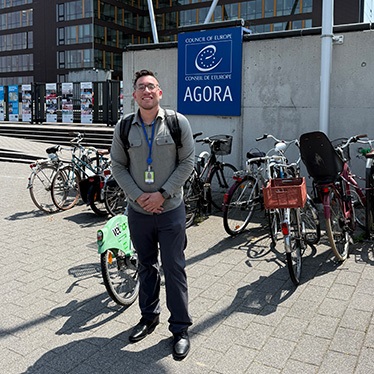Riverine Citizenship: A Bosnian City in Love with the River
Azra Hromadžić
Central European University Press, September 2024

Azra Hromadžić, associate professor of anthropology, has published “Riverine Citizenship: A Bosnian City in Love with the River” (Central European University Press, 2024).
In the book, Hromadžić explores how residents of Bihać, a town in northwest Bosnia, mobilized to block construction of a hydroelectric dam on the Una River in 2015. Drawing from over 20 years of ethnographic research, including interviews, field visits, listening walks and personal reminiscences, she charts how residents’ attachment to the river became a political force, an example of what she calls “riverine citizenship.” Citizenship and political agency can proceed from affective, material and historically situated relationships with place, she argues, not necessarily a city, state or national territory. Hromadžić recently shared insights about the book in podcast created by the publisher.
Hromadžić’s first book, “Citizens of an Empty Nation” (University of Pennsylvania Press, 2015), is an ethnographic study of how local youth responded to reunification and postwar intervention policies in Bosnia and Herzegovina. She also co-edited a volume titled "Care Across Distance: Ethnographic Explorations of Aging and Migration" (Berghahn Books, 2018) and has written numerous journal articles on topics such as postwar Bosnia, forced displacement, aging and care, and gender and women’s activism.
Hromadžić is a Laura J. and L. Douglas Meredith Professor for Teaching Excellence, a senior research associate in the Program for the Advancement of Research on Conflict and Collaboration and a faculty affiliate at the Aging Studies Institute. She is a political anthropologist whose research focuses on ethno-political violence, post-conflict reconciliation, post-socialism, and water and environmental politics. She teaches classes on anthropological theory, international aid, and peoples and cultures of the world.
From the publisher:
“Water potential is a significant natural wealth of most parts of the Balkans, and it has given rise to a surge in hydropower investments unparalleled across Europe. As part of the process, a dam was planned to be built on the Una River, which runs through the Bosnian town of Bihać. This prospect alarmed the city’s residents, culminating in a protest in 2015. The book begins with this protest, and it explores how the threat of dam construction transformed the seemingly apolitical love of the river into a powerful political force around which thousands of people mobilized: riverine citizenship.
The book is based on interviews with participants, archival research, and over twenty years of ethnographic research. Azra Hromadžić focuses on the tension between ecological sustainability efforts in favor of renewable energy, on the one hand, and citizens’ historically shaped, deeply felt, love for the river, on the other. She shows how the language and promises of green transition can mask the forces of capitalist accumulation that drive this change ― whether in the form of building hydroelectric dams or promoting eco-tourism ― and thus set in motion another cycle of environmental degradation, social dispossession, and economic exploitation.”
Published in the Fall 2024 issue of the Maxwell Perspective
Related News
School News

Nov 24, 2025
Commentary

Nov 21, 2025
School News

Nov 18, 2025
Commentary

Nov 10, 2025